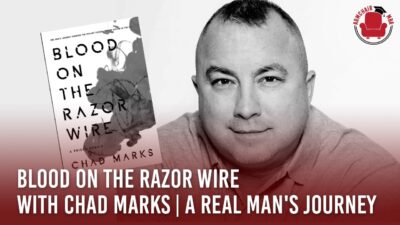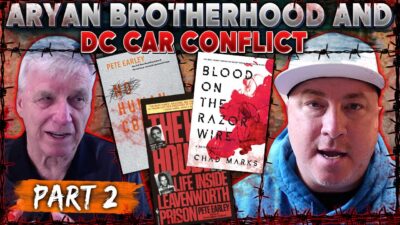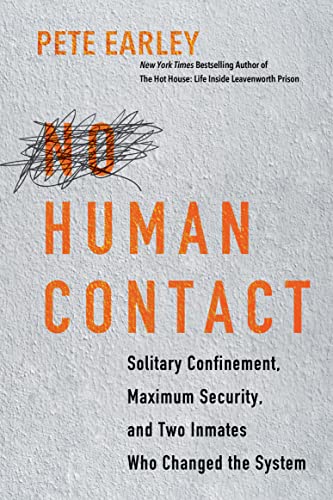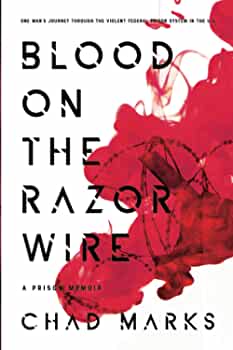
This post is about a prison memoir, BLOOD ON THE RAZOR WIRE, not mental illness.
(5-8-23) Chad Marks turned his life around by sheer determination and guts.
Raised by a single mother on welfare in a poor Rochester neighborhood, he started selling cocaine when he was thirteen years old. Three years later, he was selling crack cocaine and when he was 24 years-old, he was sentenced to a 40-year federal mandatory minimum sentence – ten years for a crack cocaine drug conspiracy, five years for possessing a weapon, and another 25 years for possession of a .22 rifle.
Society was happy to rid itself of him. And it did.
Marks was sent to “Big Sandy,” a federal maximum security prison located in a remote area of Kentucky. It was one of the most violent penitentiaries operated by the federal government, with stabbings, beatings and murders.
Chad Marks was not prepared for what he was being thrown into as a young man facing four decades behind bars.
“For me there was a choice I had to make,” he later would write in an article for Families Against Mandatory Minimums. “I could give up, and in doing so take a road of negativity, or I could choose a much different path. I saw then that all paths in life, for good or bad, begin with one small step. For so long in my life, I chose the wrong path. At that very moment, I knew I had to change my direction, because when we choose our path we choose our destination.”
Now a free man, married with children, and an successful businessman and Youtube influencer, Marks has written a remarkable memoir about his days in Big Sandy. BLOOD ON THE RAZOR WIRE is one of the most authentic books that I’ve read written by a former convict.
Marks arrived at Big Sandy in 2003, shortly after it opened. In a terrific example of government stupidity, the penitentiary was built on a mountain top above a former underground coal mine. It cost $40 million to remediate the site before construction and after Big Sandy opened, a guard tower began to tilt and part of a building began to sink. Costs to fix these and other problems hit $170 million, making it the most expensive government prison ever built. Sadly, no one has ever been held accountable for wasting millions of tax dollars by choosing such a problematic site.
The bureau of prisons has been on a steady decline since the retirement of Norman Carlson, its last effective director. There have been attempts to politicize it and a myriad of recent articles have documented corruption within its ranks and mistreatment by guards. Big Sandy has not been immune from such tales. A photo in Marks’ book shows an inmate with a homemade shank sticking out of his face under his nose.
A third of Big Sandy’s 1,300 prisoners come from Washington D.C., which means the D.C. Blacks prison gang and the white supremacist Aryan Brotherhood white gang frequently clash over controlling drugs and gamblings debts inside the prison. When Marks arrived, he was tabled a White Independent. “I don’t belong to a gang, or group. For the most part, I am at the low end of the totem pole around here and on my own. Being on your own in prison is not the best choice. When you are by yourself in prison, it is like being a lone zebra near a pride of hungry lions on the African plains.” Marks writes in his memoir. 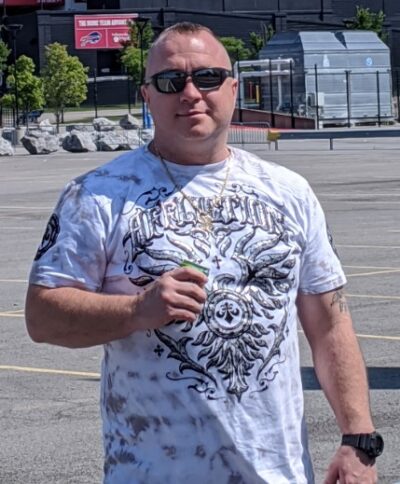
Eventually, he joins a “car” – a group of other New York State convicts – who hang together for protection and he becomes familiar with his neighbors and new home. Hustle Man approaches him with contraband for sale. “I got what the commissary ain’t have,” Hustle Man explains. “Naked ladies (photos) go for eight stamps (currency in prison). When Marks declines, Hustle Man warns him not to come back ‘window shopping’ to satisfy himself later. Half Dead explains that he is “half dead cause I’m half dead – life sentence bro.” A tattoo on his forehead reads “White Pride.” He is a Nazi. Soldier Boy is a mentally ill convict – a “bugout.”
“Judges, prosecutors, Congress, no one knows what is really going on in here,” he writes. “If they did, maybe someone would shut this place down. Start over. Culture change. All manner of problems, and death, and violence find people in here: people who aren’t looking for any of it. One of the three is always knocking at my door no matter how much I want to avoid them.”
Marks is tested, but prevails among convicts and is able to move to a lower level prison.
“I began to spend my days in the law library so that I could assist my attorney on my appeal. In time I learned the law. took a lot of hard work and dedication. Before long other prisoners sought me out to help them with their own appeals, post-conviction motions, administrative issues, and other legal concerns. I decided to help people who came to me for help — but I would not help them for free. They had to show a sincere desire that they wanted to be law-abiding citizens if and when they were released from prison. This was important to me because I felt that while I might never get out of prison these other men would..Men who did not have a GED had to enroll in school, and those who had violence on their records had to enroll in the Alternative to Violence Project Seminar, to which I was a facilitator. Before long I was winning cases, and in one case a man was reunited with his family 18 years and four months earlier than he ever expected. But my wins where not the ones that came in courts; my wins came when these men began to educate themselves, and learned to appreciate freedom. Before long I felt I could do more if I was teaching them how to read and write. I started what I labeled a fast-track GED program and all of my students earned their GEDs through that 90-day program. One student did it in 89 days. Along these lines, I have also completed more than 90 rehabilitative programs myself.
In 2019 Marks wrote and filed his own Motion for Reduction of Sentence and a court sided with him and reduced his 40 year sentence to 20 years. After his release Chad Marks continues his work for prisoner’s rights as a paralegal for Freedom Fighters & Prison Consultants. He is also the owner of FEL$CON, a business that provides services to prisoners across the country. But he is best known for his Youtube channel about prison related subjects.
I met Marks while doing publicity for my new book, NO HUMAN CONTACT: Solitary Confinement, Maximum Security and Two Inmates Who Changed the System. He was interested in interviewing me because he had read my earlier book, The Hot House: Life Inside Leavenworth Prison, while he was incarcerated. Before the interview, I read BLOOD ON THE RAZOR WIRE and was impressed. (Full disclosure – Marks liked NO HUMAN CONTACT and promoted it after we talked.)
Chad Marks beat the odds for someone sentenced to forty years in prison. His book gives readers an often frightening look at what happens in a maximum security prison from an insider living it. His memoir also is a testament to the ability of man to change his life despite the obstacles that he faced outside and inside the walls.
Seth Ferranti, another former drug dealer, convict, author and filmmaker, asked Marks what it was like to be a free man.
“Tasting freedom is not something explainable in words. Words can do it no justice. But I can say being free was emotional because I was buried alive. There were times I never thought I would make it out of there but now I did. It was a long walk, over 17 years of my life was stripped away. Forever lost but now I am trying to live my best life and enjoy my freedom, and family…”
To learn more about Chad Marks, please visit his youtube channel.
